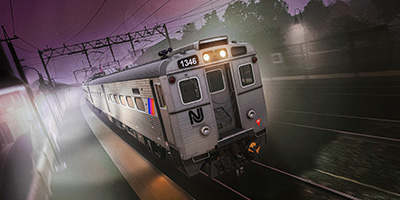WE ARE MANY.
WE ARE RAILFANS.

Railfan-Guest
October 22nd, 2020
Railfain Stephen McBain has submitted this fantastic piece introducing the work done by the UK's Industrial Diesel & Railway Preservation Group and a brief history of Industrial Railways in the UK. If you have content you'd like us to consider for We Are Railfans, get in touch via our submission form.
The Industrial Diesel & Railway Preservation Group (ID&RPG) are a group of dedicated volunteers with the aims of preserving and restoring a variety of rail related items including Locomotives and Rolling stock. We also aim to educate the public in the history and operation of all aspects of the railway scene whether that be mechanical workings of locomotives and equipment, to the history of lines.
The group has only been running for a small number of years but has made a big impact in the industrial railway scene. Our main claim to fame is the restoration of Yorkshire Engine Company’s ‘Half Janus’ 1382 (below).

The group has now moved onto helping maintain the Diesel collection at Rocks by Rail where there are a number of locomotives and wagons in need of maintenance and restoration.

Industrial Railway History in the UK:
It is often perceived that mainline locomotives were the backbone of the United Kingdom. This however isn’t necessarily correct. On a vast number of industrial sites around the country, both large and small, industrial locomotives would work day and night unassumingly moving wagons to supply all manner of goods for both home and abroad. These locomotives often didn’t get the attention from enthusiasts that their mainline counterparts did and therefore fell under the radar.
 Photo: https://www.derbysulzers.com/aw.html
Photo: https://www.derbysulzers.com/aw.html
It is often a surprise to people when industrial petrol and diesel locomotives were introduced. The large scale use of petrol locomotives can be traced back to the First World War when railways were used to carry supplies to the trenches, however these were only small locomotives of 20-50hp. Large diesel locomotives were developed in the 1930s and by the 1950s modern reliable diesel locomotives were being used in many locations. Unfortunately the large scale manufacture of diesel locomotives ended in the 1960s when many well-known locomotive builders went out of business.
 Photo: Imperial War Museums
Photo: Imperial War Museums
For all that the post-Second World War era was, as a golden age for industrial locomotives, the writing was already on the wall thanks to the increase in lorries and construction vehicles. Many internal movements in factories and quarries changed from being railway based to lorries. While some industries, such as steelworks, have found that railways are still the best way of moving heavy and dangerous loads, it is now rare for smaller factories to use railways at all. They have been replaced by forklift trucks and containers.

It is fortunate that a good number of industrial diesels have entered preservation as they are not held in the same regard as steam or mainline locomotives and to be fair in many cases they are not capable of hauling passenger trains on a regular basis. Unfortunately they are usually the first to be dismantled or sold when repairs are needed. A regrettable number have been scrapped in the 21st century while many others are unused and unloved thanks to mainline diesels becoming available like the overrated popularity of the ex British Rail Class 08.

Nowadays in industry there is an increasing trend towards heavily rebuilt or even new build locomotives that incorporate computer control, environmentally clean engines and hybrid drives. Even some small industrial specialists are rebuilding locomotives with these modern systems that when designed and implemented properly will offer higher reliability and lower costs. In conclusion, this is why these historically important locomotives should be more at the forefront of today's preserved railways. They most certainly have a place in preservation.

To find out more about the ID&RPG, including details of membership, visit: https://idrpg.co.uk/



